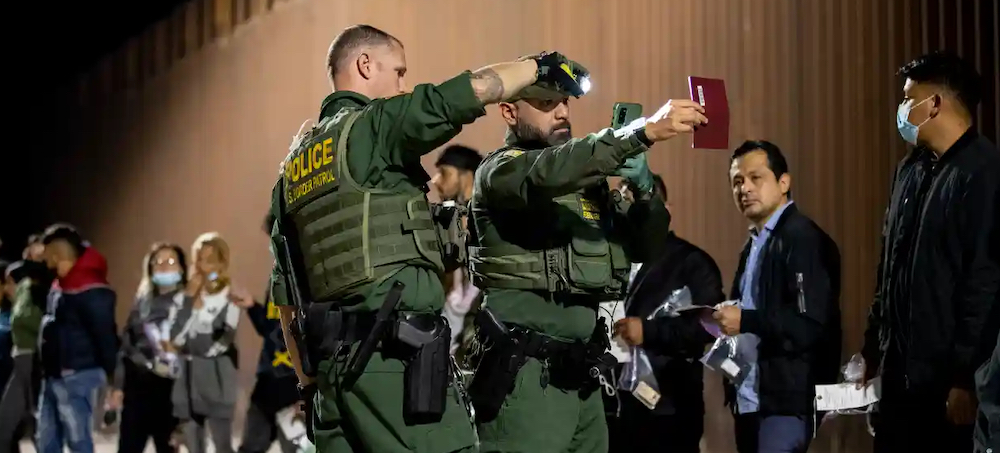Live on the homepage now!
Reader Supported News
The referendum was a rebuke of centrist Democrats’ long-held ideas about appealing to anti-abortion voters.
Since the GOP has made clear its comfort with — indeed explicit desire for — the entrenchment of far-right minority rule, the Kansas result will not shift the party’s priorities. Republicans will still push their pro-natalist, white supremacist agenda of taking bodily autonomy away from women and pregnant people. There’s no lesson in Kansas for Republicans.
It’s the Democratic establishment that should instead take a cue from the Kansas victory. The referendum result was, after all, also a rebuke to long-held centrist shibboleths — the same guiding principles that have failed to deliver nationwide abortion protections, let alone robust reproductive justice.
So-called moderate Democrats have consistently dismissed and kneecapped its progressive flank, and left-wing efforts more generally, as out of touch with what the much-mythologized average American wants. This has been true even in the case of abortion access.
Following the Supreme Court decision in Dobbs v. Jackson to throw out constitutional abortion rights, the White House cast calls for full-throated federal action to protect abortion as extreme. “Joe Biden’s goal in responding to Dobbs is not to satisfy some activists who have been consistently out of step with the mainstream of the Democratic Party,” said White House communications director Kate Bedingfield at the time.
The principle has been put into electoral action by the party’s establishment. Democrats in Washington have worked on the assumption that running anti-abortion candidates is a route to win in red states. After a draft of the Supreme Court’s ruling leaked, Democratic House Speaker Nancy Pelosi and Majority Whip Jim Clyburn continued to support Rep. Henry Cuellar, the House’s most anti-abortion Democrat, against a progressive primary challenger.
Democrats, including Biden, have wisely responded to the Kansas victory by putting abortion rights in the foreground heading into the midterms. “The court practically dared women in this country to go to the ballot box to restore the right to choose,” Biden said on Wednesday.
Given Republicans’ clear plans for passing a nationwide abortion ban should they win strong congressional majorities in November, voting is indeed crucial. But Democrats need to do more than just not be Republicans.
Mealy-mouthed liberal Democrats have not earned our vote. Lest we forget, the party establishment prioritized funding for police and roundly failed to support the basic rights, let alone the flourishing, of those who voted them into power.
As Kansas showed, grassroots struggle remains the sine qua non for defeating the white supremacist nationalists. It was hardly the work of the party establishment that achieved the ballot win. Organizers on the ground worked day and night to alert voters of the ballot measure, raise funds, build support, and counter heavy-handed manipulations from the Republican side. (The ballot’s wording was misleading, and the vote was scheduled on a key primary day for Republican candidates.)
Instead of taking the grassroots approach, though, centrist Democrats have until now been all too happy to compromise with the far right. Purportedly in the name of the “average American,” popular measures like universal health care, climate protections, student debt forgiveness, and minimum wage hikes, among other policies, have been sacrificed at the altar of bipartisan pandering and fealty to moribund institutions.
Part of the failure of imagination, of course, lies in the Democrats’ projection of the mythologized “average American” itself — invariably pictured as white and right-leaning. Among establishment Democrats, this figure has taken consistent precedence over living Black, Indigenous, and other people of color, as well as trans and nonbinary people, from whom Democrats presume support.
I’m not suggesting that the intertwined fights for racial, social, economic justice, and LGBTQ+ rights — however necessarily enmeshed they are in the fight for true reproductive justice — carry the same popular support as does protecting abortion access. The Kansas result is unlikely to profoundly shift establishment Democrats and liberal media mainstays away from their long held, false assumption that power is won by finding middle ground with the increasingly fascist right.
Kansas, though, might be enough for a limited Democratic response to campaign harder around abortion. That would be its own small victory.
In the meantime, Kansas is a reminder for the rest of us that there is power in our numbers.
 Bernie Sanders. (photo: Antonella Crescimbeni)
Bernie Sanders. (photo: Antonella Crescimbeni)
"As currently written, this is an extremely modest bill that does virtually nothing to address the enormous crises facing the working families of our country," Sanders said in a Wednesday floor speech. "It falls far short of what the American people want, what they need, and what they are begging us to do."
It marks the second day in a row that the Vermont independent has advocated for a wide range of Democratic initiatives from the now-defunct Build Back Better Act — including the extension of the child tax credit, universal pre-K, medicare expansion, and tuition-free community college. With regards to climate change, Sanders read a letter Wednesday from the Center for Biological Diversity that called the proposed bill a "climate suicide pact."
"In my view, we have got to do everything possible to take on the greed of the fossil fuel industry, not give billions of dollars in corporate welfare to an industry that has been destroying our planet," the Senator said.
Through a process called budget reconciliation, Senate Democrats can pass the $740 billion package with a simple majority in the evenly-split Senate. But all 50 Senate Democrats must be on board for the bill to clear the Senate and reach President Joe Biden's desk.
With Sen. Joe Manchin of West Virginia in support, many have speculated the pivotal vote will be that of Sen. Kyrsten Sinema of Arizona, who has not said whether she will support the bill. The Arizona Democrat reportedly wants to cut a measure in the legislation that would narrow the carried interest loophole and also seeks $5 billion in additional drought resiliency funding.
Despite Sanders' reservations with the legislation, he is ultimately expected to support it, but he hasn't provided a firm answer.
"Well, right now we're taking a hard look," the Senator said yesterday when asked about his support for the bill. "And what I will tell you is we're going to offer amendments to improve it … and we will see what happens."
Sanders announced he plans to introduce several amendments for lawmakers to consider during the Senate "vote-a-rama," a marathon session of amendment votes that could end up changing the legislation. Among those proposals is ensuring Medicare pays the same amount for prescription drugs as the Department of Veterans' Affairs.
 Abortion rights protesters outside the Senate chambers in Indiana on August 5, 2022. (photo: Cheney Orr/Reuters)
Abortion rights protesters outside the Senate chambers in Indiana on August 5, 2022. (photo: Cheney Orr/Reuters)
The ban, which takes effect Sept. 15, includes some exceptions. Abortions would be permitted in cases of rape and incest, before 10-weeks post-fertilization; to protect the life and physical health of the mother; and if a fetus is diagnosed with a lethal anomaly. Victims of rape and incest would not be required to sign a notarized affidavit attesting to an attack, as had once been proposed.
Under the bill, abortions can be performed only in hospitals or outpatient centers owned by hospitals, meaning all abortion clinics would lose their licenses. A doctor who performs an illegal abortion or fails to file required reports must also lose their medical license — wording that tightens current Indiana law that says a doctor "may" lose their license.
"I am personally most proud of each Hoosier who came forward to courageously share their views in a debate that is unlikely to cease any time soon," Gov. Eric Holcomb said in the statement announcing that he had signed the measure. "For my part as your governor, I will continue to keep an open ear."
His approval came after the Senate approved the ban 28-19 and the House advanced it 62-38.
Indiana was among the earliest Republican-run state legislatures to debate tighter abortion laws after the Supreme Court ruling in June that removed constitutional protections for the procedure. But it is the first state to pass a ban through both chambers, after West Virginia lawmakers on July 29 passed up the chance to be that state.
"Happy to be completed with this, one of the more challenging things that we've ever done as a state General Assembly, at least certainly while I've been here," Senate President Pro-Tem Rodric Bray told reporters after the vote. " I think this is a huge opportunity, and we'll build on that as we go forward from here."
Sen. Sue Glick of LaGrange, who sponsored the bill, said that she does not think "all states will come down at the same place" but that most Indiana residents support aspects of the bill.
Some senators in both parties lamented the bill's provisions and the impact it would have on the state, including low-income women and the health care system. Eight Republicans joined all 11 Democrats in voting against the bill, though their reasons to thwart the measure were mixed.
"We are backsliding on democracy," said Democratic Sen. Jean Breaux of Indianapolis, who wore a green ribbon Friday signifying support for abortion rights, on her lapel. "What other freedoms, what other liberties are on the chopping block, waiting to be stripped away?"
Republican Sen. Mike Bohacek of Michiana Shores spoke about his 21-year-old-daughter, who has Down syndrome. Bohacek voted against the bill, saying it does not have adequate protections for women with disabilities who are raped.
"If she lost her favorite stuffed animal, she'd be inconsolable. Imagine making her carry a child to term," he said before he started to choke up, then threw his notes on his seat and exited the chamber.
Republican Sen. Mike Young of Indianapolis, however, said the bill's enforcement provisions against doctors are not stringent enough.
Such debates demonstrated Indiana residents' own divisions on the issue, displayed in hours of testimony lawmakers heard over the past two weeks. Residents rarely, if ever, expressed support for the the legislation in their testimony, as abortion-rights supporters said the bill goes too far while anti-abortion activists expressed it doesn't go far enough.
The debates came amid an evolving landscape of abortion politics across the country as Republicans face some party divisions and Democrats see a possible election-year boost.
Republican Rep. Wendy McNamara of Evansville, who sponsored the House bill, told reporters after the House vote that the legislation "makes Indiana one of the most pro-life states in the nation."
Outside the chambers, abortion-rights activists often chanted over lawmakers' remarks, carrying signs like "Roe roe roe your vote" and "Build this wall" between church and state. Some House Democrats wore blazers over pink "Bans Off Our Bodies" T-shirts.
Indiana's ban followed the political firestorm over a 10-year-old rape victim who traveled to the state from neighboring Ohio to end her pregnancy. The case gained attention when an Indianapolis doctor said the child came to Indiana because of Ohio's "fetal heartbeat" ban.
Religion was a persistent theme during legislative debates, both in residents' testimony and lawmakers' comments.
In advocating against the House bill, Rep. Ann Vermilion condemned fellow Republicans who have called women "murderers" for getting an abortion.
"I think that the Lord's promise is for grace and kindness," she said. "He would not be jumping to condemn these women."
 A wounded Palestinian child is carried to a hospital following an Israeli air raid on the Gaza Strip on Friday. (photo: Anas Baba/AFP)
A wounded Palestinian child is carried to a hospital following an Israeli air raid on the Gaza Strip on Friday. (photo: Anas Baba/AFP)
After deadly air raids on Gaza, analysts question Israel’s motivation amid political turmoil and with new elections upcoming.
On Friday, Israel launched missiles throughout the besieged Palestinian enclave, killing 10 people, including a five-year-old girl, a 23-year-old woman, as well as Taysir al-Jabari, a commander of Islamic Jihad’s military wing.
Islamic Jihad group said it fired more than 100 rockets into Israel in retaliation for the air raids. The violence raised fears of another war on Gaza by Israel, just 15 months after a month-long conflict that killed more than 260 people.
“Everyone is nervous, there is no appetite for war,” said Tamer Qarmout from the Doha Institute of Graduate Studies, who hails from Gaza and has family there.
“Gaza has witnessed four or five major conflicts over the last 15 years. We’re still talking about the reconstruction of the Gaza Strip. Gaza has never really recovered, it just lives from conflict to conflict,” he told Al Jazeera.
Israel’s deadly attacks came after Israeli forces arrested Bassam al-Saadi, a senior member of the armed group, earlier in the week. Al-Saadi was detained during an Israeli raid in the West Bank city of Jenin, during which a teenager was killed.
‘Shock and awe’
Prior to the assassination of al-Jabari, Israel tightened its grip on the coastal enclave, already 15 years under a brutal blockade, by shutting down all border crossings.
Israel also closed roads around Gaza earlier this week and sent reinforcements to the border as it braced for a response after al-Saadi’s arrest.
Friday’s attack came on the heels of previous assaults, including drone strikes on the Gaza Strip, leading some observers to suggest the current escalation is a calculated move. The West Bank, too, has also seen a rise in Israeli attacks by soldiers and settlers alike, as well as arrests of Palestinians and home demolitions.
“Israel is arming its settlers in the West Bank to shoot and kill Palestinians and not to [do so] under the chain of command of the military. So what we’re seeing right now is an intensification of Israel’s military strategy of ‘shock and awe’,” said Mariam Barghouti, a Ramallah-based researcher.
“Let’s also keep in mind that Israeli elections are coming this November, and there’s this trend of Israeli leaders to use Gaza as a weapon to rally the Israeli settler population.”
‘It’s a contest’
Israel appeared intent on escalating the situation when Prime Minister Yair Lapid said on Thursday that Israel “will not shy away from using force to restore normal life in the south of the country, and we will not stop the policy of arresting terrorist operatives in Israel”.
Nour Odeh, a former Palestinian Authority government spokesman and a political analyst, suggested the latest attack could be politically motivated.
“Gaza is traumatised. It has not recovered yet. Hamas and Jihad were going out of their way to maintain calm and give people a chance to breathe. No one was seeking an escalation – except Lapid,” said Odeh.
“It’s a contest to show who’s more powerful. Lapid wants to prove he has what it takes, even though he has no military background,” she added.
‘Gazans will pay’
Analysts said there are intersecting electoral influences fueling Israel’s decision to start what could possibly be another war.
As is the case almost every summer, the current governing coalition in Israel is meaning to look hawkish in the lead-up to another election cycle in which the Likud Party – headed by former Prime Minister Benjamin Netanyahu – is poised for a return.
It also came at a time when the United States is gearing up for midterm elections, and with the Democrats elevated by some minor legislative victories, the Biden administration will be more averse to telling Israel to cease its attacks, or holding it accountable for war crimes such as the killing of the young girl and other civilians on Friday.
“Israel is using Gazans as sacrificial pawns in their ongoing struggle for power and are acting with impunity because they know nobody can or will hold them accountable,” said Tariq Kenney-Shawa, a US-based policy fellow at Al Shabaka – The Palestinian Policy Network, an independent, nonprofit think-tank.
“The fact that zero rockets were fired from Gaza prior to Israel’s unilateral decision to start a massacre, despite the tightening of the blockade, and the assassination of PIJ [Palestinian Islamic Jihad] leaders, it is evidence of the vacuity of Israeli security concerns.
“Israel appears bent on striking PIJ hard, so PIJ will have to respond as they have already indicated. This is going to escalate again and Gazans will pay.”
Gideon Levy, an Israeli commentator and writer for the Israeli newspaper Haaretz, told Al Jazeera that bombing Gaza has become a way for Israeli politicians to show their “strength” ahead of voting.
“I’m very suspicious that it has to do with the elections. Any prime minister needs to prove himself, especially if he comes from the centre-left in Israel. And we have a new prime minister, and he wants to show that he’s macho like all the former prime ministers. All those are very poor excuses to go for another round in Gaza,” Levy said.
READ MORE  Albert Woodfox was a former member of the Black Panthers who was put in solitary confinement at the Louisiana State Penitentiary for 42 years. (photo: Alain Jocard/AFP/Getty Images)
Albert Woodfox was a former member of the Black Panthers who was put in solitary confinement at the Louisiana State Penitentiary for 42 years. (photo: Alain Jocard/AFP/Getty Images)
His term in solitary was perhaps the longest in American history. He described how he kept his sanity, and dignity, in an acclaimed memoir.
His lead lawyer, George Kendall, said the cause was Covid-19. Mr. Kendall added that Mr. Woodfox also had a number of pre-existing organ conditions.
Mr. Woodfox was placed in solitary confinement in 1972 after being accused of murdering Brent Miller, a 23-year-old corrections officer. A tangled legal ordeal ensued, including two convictions, both overturned, and three indictments stretching over four decades.
The case struck most commentators as problematic. No forensic evidence linked Mr. Woodfox to the crime, so the authorities’ argument depended on witnesses, who over time were discredited or proved unreliable.
“The facts of the case were on his side,” The New York Times editorial board wrote in a 2014 opinion piece about Mr. Woodfox.
But Louisiana’s attorney general, Buddy Caldwell, saw things differently. “This is the most dangerous person on the planet,” he told NPR in 2008.
Mr. Woodfox’s punishment defied imagination, not only for its monotony — he was alone 23 hours a day in a six-by-nine-foot cell — but also for its agonies and humiliations. He was gassed and beaten, he wrote in a memoir, “Solitary” (2019), in which he described how he had kept his sanity, and dignity, while locked up alone. He was strip-searched with needless, brutal frequency.
His plight first received national attention when he became known as one of the “Angola Three,” men held continuously in solitary confinement for decades at the Louisiana State Penitentiary, which is commonly called Angola, after a slave plantation that once occupied the site.
In 2005, a federal judge wrote that the length of time the men had spent in solitary confinement went “so far beyond the pale” that there seemed not to be “anything even remotely comparable in the annals of American jurisprudence.”
Mr. Woodfox would spend more than another decade in solitary before becoming, in 2016, the last of the three men to be released from prison.
His first stint at Angola came in 1965, after he was convicted of a series of minor crimes committed as a teenager. The prison was notoriously harsh, even to the point of conjuring the days of slavery. Black prisoners, like Mr. Woodfox, did field work by hand, overseen by white prison guards on horseback, shotguns across their laps. New inmates were often inducted into a regime of sexual slavery that was encouraged by guards.
Released after eight months, he was soon charged with car theft, leading to another eight months at Angola. After that, he embarked on a darker criminal career, beating and robbing people.
In 1969, Mr. Woodfox was convicted again, this time for armed robbery, and sentenced to 50 years. By then a seasoned lawbreaker, he managed to sneak a gun into the courthouse where he was being sentenced and escape. He fled to New York City, landing in Harlem.
A few months later he was incarcerated again, this time in the Tombs, the Manhattan jail, where he spent about a year and a half.
It proved to be a turning point, he wrote in his memoir. At the Tombs, he met members of the Black Panther Party, who governed his tier of cells not by force but by sharing food. They held discussions, treating people respectfully and intelligently, he wrote. They argued that racism was an institutional phenomenon, infecting police departments, banks, universities and juries.
“It was as if a light went on in a room inside me that I hadn’t known existed,” Mr. Woodfox wrote. “I had morals, principles and values I never had before.”
He added, “I would never be a criminal again.”
He was sent back to Angola in 1971 thinking himself a reformed man. But his most serious criminal conviction — for murdering the Angola corrections officer in 1972, which he denied — still lay ahead of him, and with it four decades in solitary, a term broken for only about a year and a half in the 1990s while he awaited retrial.
The other two members of the Angola Three, Robert King and Herman Wallace, were also Panthers and began their solitary confinement at Angola the same year as Mr. Woodfox. The three became friends by shouting to one another from their cells. They were “our own means of inspiration to one another,” Mr. Woodfox wrote. In his spare time, he added, “I turned my cell into a university, a hall of debate, a law school.”
He taught one inmate how to read, he said, by instructing him in how to sound out words in a dictionary. He told him to shout to him at any hour of the day or night if he could not understand something.
Albert Woodfox was born on Feb. 19, 1947, in New Orleans to Ruby Edwards, who was 17. He never had a relationship with his biological father, Leroy Woodfox, he wrote, but for much of his childhood he considered a man who later married his mother, a Navy chef named James B. Mable, his “daddy.”
When Albert was 11, Mr. Mable retired from the Navy and the family moved to La Grange, N.C. Mr. Mable, Mr. Woodfox recalled, began drinking and beating Ms. Edwards. She fled the family home with Albert and two of his brothers, taking them back to New Orleans.
As a boy, Albert shoplifted bread and canned goods when there was no food in the house. He dropped out of school in the 10th grade. His mother tended bar and occasionally worked as a prostitute, and Albert grew to loathe her.
“I allowed myself to believe that the strongest, most beautiful and most powerful woman in my life didn’t matter,” he wrote in his memoir.
His mother died in 1994, while he was in prison. He was not allowed to attend her funeral.
The first of the Angola Three to be let out of prison was Mr. King, whose conviction was overturned in 2001. The second, Mr. Wallace, was freed in 2013 because he had liver cancer. He died three days later.
In a deal with prosecutors, Mr. Woodfox was released in 2016 in exchange for pleading no contest to a manslaughter charge in the 1972 killing. By then he had been transferred out of Angola.
His incarceration over, the first thing he wanted to do was visit his mother’s grave.
“I told her that I was free now and I loved her,” he wrote. “It was more painful than anything I experienced in prison.”
Mr. Woodfox is survived by his brothers, James, Haywood, Michael and Donald Mable; a daughter, Brenda Poole, from a relationship he had in his teenage years; three grandchildren; four great-grandchildren; and his life partner, Leslie George.
Ms. George was a journalist who began reporting on Mr. Woodfox’s case in 1998 and met him in 1999. They became a couple when he was released from prison.
Ms. George co-wrote Mr. Woodfox’s book, which was a finalist for the National Book Award and the Pulitzer Prize in nonfiction. In a review in The Times, Dwight Garner called “Solitary” “uncommonly powerful”; in The Times Book Review, the writer Thomas Chatterton Williams described it as “above mere advocacy or even memoir,” belonging more “in the realm of stoic philosophy.”
After being released, Mr. Woodfox had to relearn how to walk down stairs, how to walk without leg irons, how to sit without being shackled. But in an interview with The Times right after his release, he spoke of having already freed himself years earlier.
“When I began to understand who I was, I considered myself free,” he said. “No matter how much concrete they use to hold me in a particular place, they couldn’t stop my mind.”
 U.S. Border Patrol officers at a checkpoint at the border between Mexico and the U.S., in Yuma, Arizona. (photo: Étienne Laurent/EPA)
U.S. Border Patrol officers at a checkpoint at the border between Mexico and the U.S., in Yuma, Arizona. (photo: Étienne Laurent/EPA)
ACLU says there are nearly 50 cases of Sikhs saying religious headwear was taken as they passed through CBP checks in Arizona
In a letter to CBP, the American Civil Liberties Union (ACLU) of Arizona said there had been nearly 50 documented cases of Sikhs saying religious headwear was taken and never returned as they passed through CBP checks in Yuma, Arizona.
The cases were reported by the International Rescue Committee (IRC), a humanitarian nonprofit that helps asylum seekers released by CBP. The nonprofit has reported a sharp increase in turban confiscations since June.
“While [IRC] has encountered cases of religious headwear being confiscated every month of this year,” the ACLU said, “in June 2022 the number of reports rose sharply, prompting concern that border officials have ramped up their efforts to seize these sacred items.”
The ACLU is asking CBP to investigate the confiscations as civil rights violations, citing policy that says officers should “remain cognizant of an individual’s religious belief while accomplishing an enforcement action in a dignified and respectful manner”.
The ACLU wrote: “For many Sikhs, the turban is a central aspect of their religious identity; exposing their ‘naked’ heads to others is considered sacrilegious and shameful.
“By confiscating and failing to return Sikh individuals’ turbans, CBP directly interferes with their religious practice and forces them to violate their religious beliefs.”
Gurjodh Singh, an asylum seeker from India, told the Intercept and Arizona Luminaria that while he tried to insist to CBP agents his religion forbade taking off his turban, they forced him to remove it and put it in a trash pile.
He said: “They told me to take off my turban. I know a little English and I said, ‘It’s my religion.’ But they insisted. I felt so bad.”
IRC volunteers have contacted local Sikh communities to find replacements for seized turbans. One volunteer, the ACLU said, supplied “more than 50 turbans by soliciting them from family, friends and congregations”.
“Unfortunately, this is not a long-term solution because of the sheer number of turbans needed,” the ACLU added.
The CBP commissioner, Chris Magnus, said an investigation had been opened.
“We take allegations of this nature very seriously,” Magnus said. “Our expectation is that CBP employees treat all migrants we encounter with respect.”
The ACLU said concerns over the confiscation of turbans and other religious clothing were raised in 2019 and 2020 and “despite numerous contacts about this issue, to our knowledge, no meaningful investigation has occurred”.
 A local fire chief and his daughter drop off goods for a local community member in Jackson, Kentucky, on Sunday. (photo: Seth Herald/AFP/Getty Images)
A local fire chief and his daughter drop off goods for a local community member in Jackson, Kentucky, on Sunday. (photo: Seth Herald/AFP/Getty Images)
“No one is denying the amount of rain we had — it truly was a 1,000 year event — but did the strip mines contribute? Absolutely," a Kentucky lawyer said.
Compacted dirt, destroyed mountaintops and deforestation in eastern Kentucky have often been left ignored by the coal companies that mined there, despite legal requirements that they attempt to return the land to its natural state when mining concludes. In recent decades, that spurned responsibility has, at times, turned heavy rains into floods and caused local residents who once counted on mining for jobs and prosperity to bring litigation against their former employers in Appalachian courtrooms.
Lawyers who have pursued these cases in the past said it is still too early to pursue a case in the most recent flooding, as studies need to be conducted and claimants contacted, but interest in holding someone to account for the lost homes and at least 37 dead is growing.
"It may be too early to tell, but I've received a couple phone calls already," said Ned Pillersdorf, a Kentucky lawyer in Prestonburg who has successfully sued coal companies for flood damage in the past. "No one is denying the amount of rain we had — it truly was a 1,000 year event — but did the strip mines contribute? Absolutely."
Kentucky, particularly the eastern mountains, are littered with abandoned coal mines. Many are a result of strip mining or mountaintop removal mining, the latter a method in which mining companies use explosives to blast off a mountain's summit to get to the coal inside.
Pillersdorf, whose home was flooded, noted that the areas worst hit in his county are the ones closest to the strip mines.
"It is obviously just a clear slam dunk in terms of corporate irresponsibility," said Alex Gibson, the executive director of Appalshop, the culture and education center in Whitesburg that was hit by more than 6 feet of water. "And of how we can predict an outcome and ignore all the signs along the way until the tragedy happens and then act like, 'Yeah, but we didn't see it coming. It was God's work.'"
The Kentucky Coal Association, which represents the state's mining operations, did not immediately respond to a request for comment.
The loss of the natural ridge lines, vegetation and trees, and the cracks in the mountains that are largely owned by companies often funnels rainwater into the thin valleys, or low-lying hollows, where most eastern Kentuckians make their homes.
Without these natural protections, regional flooding has grown as climate change brings new levels of precipitation up from the Gulf Coast to Appalachia.
“They’re saying it’s a natural disaster, but I’m sorry. This is a disaster that was made by a whole bunch of mining that’s been going on for the past 40 years," said Jack Spadero, the former director of the National Mine Health and Safety Academy who has testified as an expert witness in numerous coal mine lawsuits in recent years. “It has changed the landscape of eastern Kentucky dramatically.”
'Like pulling teeth'
The Surface Mining Control and Reclamation Act of 1977, or SMCRA, was a federal regulation that was supposed to prevent coal companies from leaving abandoned mines behind. The law required mine owners to reclaim the land and return it to its natural form as much as possible. In the ensuing 45 years, many companies have avoided that work and many states in the region, like Kentucky, turned a blind eye to it.
Now, there are more than 2,800 entries for Kentucky in the national inventory of known-abandoned mine land, according to a Department of Interior database, and much of it is located in the state's eastern hill country. Experts also said that the number in the inventory is likely a conservative figure and that recent coal company bankruptcies have made it more difficult to pursue accountability.
SMCRA required every state to enforce the financial responsibility and reclamation obligation of the coal mine operators in their state. While some states required mining companies to pay reclamation costs upfront, others — like Kentucky — allowed them to put up a bond for the potential costs. In the past, small companies in Kentucky were allowed to create a pooled fund, while larger ones were able to self-bond, but the majority were done through a third party.
"There are surety companies that are holding these bonds, which are woefully inadequate to do the real reclamation work, but many are even fighting to turn over those bonds, so it's like pulling teeth," said Joe Childers, who has litigated cases for vulnerable Kentuckians against major energy companies for more than 40 years. "In the meantime, nothing gets done. The hillsides are scarred, they're not reclaimed and you get a rain event like last week and you have terrible flooding. And it was totally exacerbated by the lack of proper regulation."

Since 2013, Kentucky requires companies to pay into a single bond pool through what essentially serves as a tax on a certain amount of acreage or coal tonnage. But the difference between the liabilities that were left behind and the trust fund the state created in 2013 has grown significantly.
John Mura, a spokesperson for The Kentucky Energy and Environment Cabinet, said by email that the state agency was “engaged right now organizing cabinet aid” to the affected areas and declined to comment further.
About 408,000 Kentuckians live within one mile of abandoned mine land, the regional think tank Ohio River Valley institute estimated last year, and it will cost nearly $1.2 billion to remediate it. As of 2020, the Kentucky fund had about $52 million in it, according to a state report.
Kentucky spent a little more than $1.5 million from its reclamation fund, according to the 2022 executive budget. The state is expected to receive an additional $75 million this year as part of President Joe Biden's infrastructure law, which dedicated $11.3 billion toward abandoned mine reclamation over the next 15 years. Last year, the state received $9 million from the federal government.
The new sum is huge, but "it's just a drop in the bucket" to address the need for communities across Appalachia, said Sarah Surber, a public health professor at Wayne State University who has studied environmental justice issues in the region and practiced law there for more than a decade.
"How do you prioritize [the funding]?" she said. "You have so many that have been left abandoned or sitting in limbo, you have more coal mine company bankruptcies anticipated, so how do you decide what mines get reclaimed and what does that mean for communities and their protection in terms of pollution and flooding issues?"
Lawsuit challenges
Kevin Thompson, an attorney whose work earned national attention for challenging powerful coal CEO Don Blankenship, said the images he saw out of Kentucky this past week gave him flashbacks to the 2009 King Coal case he worked on in West Virginia and the photographs he took of the days after the flooding that happened there.
That case brought 20 low-income families against four powerful companies that Thompson argued were responsible for two flooding incidents that washed away people's homes.

Thompson said, however, that it would be much more difficult to bring a challenge more than a decade later. While the issues are the same, he said that partisanship and the politicization of science have created new challenges in the courtroom.
"There's always been politics, but what has changed is people's unwillingness to accept science and engineering principles," he said. "It has jaded their political views to the point that plaintiffs can't get fair compensation for damage done to them by mountaintop removal."
Not all views are skewed by politics, Thompson clarified, but it can make it difficult to get all 12 members of a jury to side with the plaintiff.
“Almost all of the law firms that I know that represent coal mining families have stopped litigating these kinds of cases,” Thompson added. “It’s become really difficult.”
A further issue, highlighted by multiple attorneys who have practiced in the state, is how closely tied so many people are to the coal industry. The industry has contracted massively since the 1980s, accounting for a fraction of the jobs it once boasted in Kentucky, and it is clear that work isn't coming back.
What remains of the industry, however, many remain protective of — especially as the number of coal company bankruptcies and mine closures grow.
In 2008 the country boasted more than 1,500 mines, according to Energy Information Administration. In 2020, that number had declined to 410.
The loss of the mines take a toll, but so does the lack of a replacement economy and the loss of population because of it.
"These are costs that are hidden and have been hidden for however long mining has gone on in central Appalachia," said Surber, who admitted she left the region because of similar frustrations. "We don't think about the environmental costs, the emergency funds that are dispatched by the federal and state governments or the people who will leave the area forever because of it."
Any state that remains a single industry state is at risk.
Look around.
As Dirty Coal has declined and filed for bankruptcies, a catastrophic trail of environmental devastation is left due to the failure of oversight and regulation.
KENTUCKY: MOVE FORWARD!
https://youtu.be/DFwZQIf9qPc
The current Senators for KENTUCKY are the Turtle, Moscow Mitch McConnell who wallows in his $$$ and obstruction, failing Kentucky...and the Clown RAND PAUL who has done nothing for KENTUCKY.
Rand Paul’s Kentucky Senate Opponent Charles Booker Wears Noose In Campaign Ad
Kentucky Democratic Senate nominee Charles Booker released a campaign ad on Wednesday showing him wearing a noose.
The ad shows a noose hanging from a tree and historical images of a Black man being lynched and a flag hanging from a building that reads “A man was lynched yesterday.” Booker, who is Black, narrates, “The pain of our past persists to this day. In Kentucky, like many states throughout the South, lynching was a tool of terror. It was used to kill hopes for freedom.”
“It was used to kill my ancestors,” says Booker, with a noose loosely tied around his neck.
“Now, in a historic victory for our Commonwealth, I have become the first Black Kentuckian to receive the Democratic nomination for U.S. Senate,” he continues.
Booker goes on to criticize his Republican opponent, incumbent Sen. Rand Paul, for having “compared expanded health care to slavery.”
In 2011, Paul made that comparison.
“With regard to the idea whether or not you have a right to health care you have to realize what that implies. I am a physician. You have a right to come to my house and conscript me. It means you believe in slavery,” he said. “You are going to enslave not only me but the janitor at my hospital, the person who cleans my office, the assistants, the nurses. … You are basically saying you believe in slavery.”
In the ad, Booker also calls Paul “the person who said he would have opposed the Civil Rights Act.” However, Paul has said he supports the Civil Rights Act.
Booker also called out Paul for having “single-handedly blocked an anti-lynching act from being Federal law.”
Although Paul blocked The Emmett Till Antilynching Act in 2020, he voted for it in 2022 and it became law in March.
The ad plays the sound of a rope getting tighter and Booker says, “The choice couldn’t be clearer.” Booker holds onto the noose and asks, “Do we move forward together? Or do we let politicians like Rand Paul forever hold us back and drive us apart?”
“In November,” says Booker as he removes the knot from his neck, “we will choose healing. We will choose Kentucky.”
This video is one of the hardest things I have done, but I know it is something I have a responsibility to do. The power behind a movement is the ability to tell a story that captures hearts, open minds, inspire, and challenge us to mobilize. This story is mine as well as many Kentuckians, who have struggled with structural racism and inequity. As the first Black Kentuckian to receive the Democratic nomination for the U.S. Senate, I have a responsibility to represent hard working Kentuckians from the forgotten places by replacing the old, racist Southern Strategy with a new one that lifts love and unity over hate and division. Watch below and join me in moving Kentucky forward, together.
Any state that remains a single industry state is at risk.
Look around.
As Dirty Coal has declined and filed for bankruptcies, a catastrophic trail of environmental devastation is left due to the failure of oversight and regulation.
KENTUCKY: MOVE FORWARD!
The current Senators for KENTUCKY are the Turtle, Moscow Mitch McConnell who wallows in his $$$ and obstruction, failing Kentucky...and the Clown RAND PAUL who has done nothing for KENTUCKY.
WE sent Americans to fight overseas. WE need to take care of their illnesses.
Rand Paul one of 11 senators to vote against PACT veterans health care bill.
Kentucky Sen. Rand Paul was one of 11 Republican U.S. senators to vote "no" on the PACT Act, which allocates funding to veterans who were exposed to toxic waste pits and Agent Orange, a defoliant used widely during the Vietnam War.
The act would allow these U.S. veterans to have more access to health care, but Paul said this could have dangerous economic implications.
The bill passed through the Senate in a vote of 86-11. It will now go to President Joe Biden to be signed into law.
RAND PAUL has an opponent, CHARLES BOOKER.
Please support CHARLES BOOKER & EMBRACE THE FUTURE!
Special Coverage: Ukraine, A Historic Resistance
READ MORE
Follow us on facebook and twitter!
PO Box 2043 / Citrus Heights, CA 95611



No comments:
Post a Comment
Note: Only a member of this blog may post a comment.